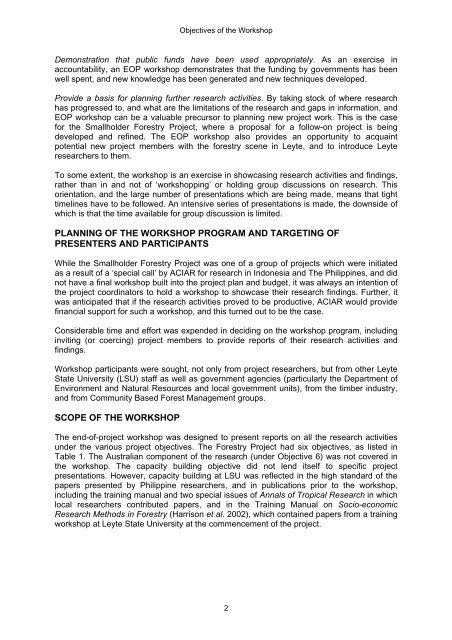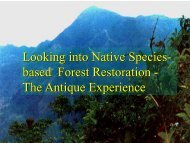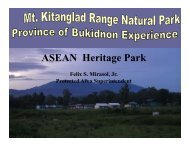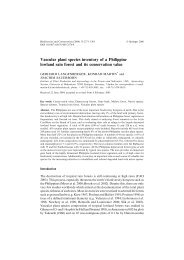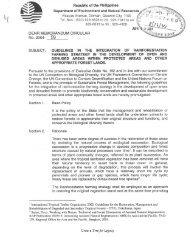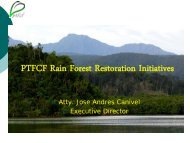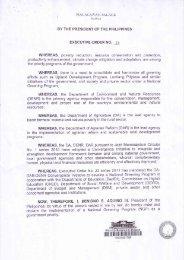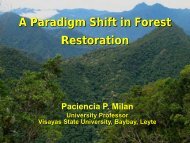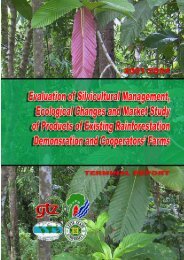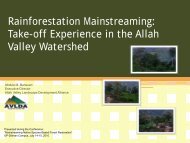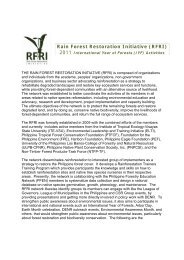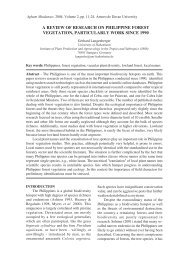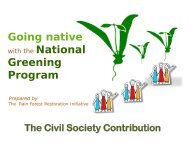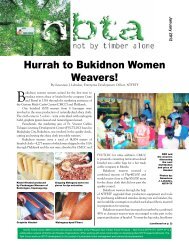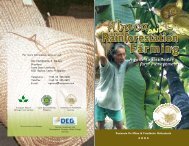Overview of timber demand and supply on Leyte Island ... - UQ eSpace
Overview of timber demand and supply on Leyte Island ... - UQ eSpace
Overview of timber demand and supply on Leyte Island ... - UQ eSpace
Create successful ePaper yourself
Turn your PDF publications into a flip-book with our unique Google optimized e-Paper software.
Objectives <str<strong>on</strong>g>of</str<strong>on</strong>g> the Workshop<br />
Dem<strong>on</strong>strati<strong>on</strong> that public funds have been used appropriately. As an exercise in<br />
accountability, an EOP workshop dem<strong>on</strong>strates that the funding by governments has been<br />
well spent, <str<strong>on</strong>g>and</str<strong>on</strong>g> new knowledge has been generated <str<strong>on</strong>g>and</str<strong>on</strong>g> new techniques developed.<br />
Provide a basis for planning further research activities. By taking stock <str<strong>on</strong>g>of</str<strong>on</strong>g> where research<br />
has progressed to, <str<strong>on</strong>g>and</str<strong>on</strong>g> what are the limitati<strong>on</strong>s <str<strong>on</strong>g>of</str<strong>on</strong>g> the research <str<strong>on</strong>g>and</str<strong>on</strong>g> gaps in informati<strong>on</strong>, <str<strong>on</strong>g>and</str<strong>on</strong>g><br />
EOP workshop can be a valuable precursor to planning new project work. This is the case<br />
for the Smallholder Forestry Project, where a proposal for a follow-<strong>on</strong> project is being<br />
developed <str<strong>on</strong>g>and</str<strong>on</strong>g> refined. The EOP workshop also provides an opportunity to acquaint<br />
potential new project members with the forestry scene in <strong>Leyte</strong>, <str<strong>on</strong>g>and</str<strong>on</strong>g> to introduce <strong>Leyte</strong><br />
researchers to them.<br />
To some extent, the workshop is an exercise in showcasing research activities <str<strong>on</strong>g>and</str<strong>on</strong>g> findings,<br />
rather than in <str<strong>on</strong>g>and</str<strong>on</strong>g> not <str<strong>on</strong>g>of</str<strong>on</strong>g> ‘workshopping’ or holding group discussi<strong>on</strong>s <strong>on</strong> research. This<br />
orientati<strong>on</strong>, <str<strong>on</strong>g>and</str<strong>on</strong>g> the large number <str<strong>on</strong>g>of</str<strong>on</strong>g> presentati<strong>on</strong>s which are being made, means that tight<br />
timelines have to be followed. An intensive series <str<strong>on</strong>g>of</str<strong>on</strong>g> presentati<strong>on</strong>s is made, the downside <str<strong>on</strong>g>of</str<strong>on</strong>g><br />
which is that the time available for group discussi<strong>on</strong> is limited.<br />
PLANNING OF THE WORKSHOP PROGRAM AND TARGETING OF<br />
PRESENTERS AND PARTICIPANTS<br />
While the Smallholder Forestry Project was <strong>on</strong>e <str<strong>on</strong>g>of</str<strong>on</strong>g> a group <str<strong>on</strong>g>of</str<strong>on</strong>g> projects which were initiated<br />
as a result <str<strong>on</strong>g>of</str<strong>on</strong>g> a ‘special call’ by ACIAR for research in Ind<strong>on</strong>esia <str<strong>on</strong>g>and</str<strong>on</strong>g> The Philippines, <str<strong>on</strong>g>and</str<strong>on</strong>g> did<br />
not have a final workshop built into the project plan <str<strong>on</strong>g>and</str<strong>on</strong>g> budget, it was always an intenti<strong>on</strong> <str<strong>on</strong>g>of</str<strong>on</strong>g><br />
the project coordinators to hold a workshop to showcase their research findings. Further, it<br />
was anticipated that if the research activities proved to be productive, ACIAR would provide<br />
financial support for such a workshop, <str<strong>on</strong>g>and</str<strong>on</strong>g> this turned out to be the case.<br />
C<strong>on</strong>siderable time <str<strong>on</strong>g>and</str<strong>on</strong>g> effort was expended in deciding <strong>on</strong> the workshop program, including<br />
inviting (or coercing) project members to provide reports <str<strong>on</strong>g>of</str<strong>on</strong>g> their research activities <str<strong>on</strong>g>and</str<strong>on</strong>g><br />
findings.<br />
Workshop participants were sought, not <strong>on</strong>ly from project researchers, but from other <strong>Leyte</strong><br />
State University (LSU) staff as well as government agencies (particularly the Department <str<strong>on</strong>g>of</str<strong>on</strong>g><br />
Envir<strong>on</strong>ment <str<strong>on</strong>g>and</str<strong>on</strong>g> Natural Resources <str<strong>on</strong>g>and</str<strong>on</strong>g> local government units), from the <str<strong>on</strong>g>timber</str<strong>on</strong>g> industry,<br />
<str<strong>on</strong>g>and</str<strong>on</strong>g> from Community Based Forest Management groups.<br />
SCOPE OF THE WORKSHOP<br />
The end-<str<strong>on</strong>g>of</str<strong>on</strong>g>-project workshop was designed to present reports <strong>on</strong> all the research activities<br />
under the various project objectives. The Forestry Project had six objectives, as listed in<br />
Table 1. The Australian comp<strong>on</strong>ent <str<strong>on</strong>g>of</str<strong>on</strong>g> the research (under Objective 6) was not covered in<br />
the workshop. The capacity building objective did not lend itself to specific project<br />
presentati<strong>on</strong>s. However, capacity building at LSU was reflected in the high st<str<strong>on</strong>g>and</str<strong>on</strong>g>ard <str<strong>on</strong>g>of</str<strong>on</strong>g> the<br />
papers presented by Philippine researchers, <str<strong>on</strong>g>and</str<strong>on</strong>g> in publicati<strong>on</strong>s prior to the workshop,<br />
including the training manual <str<strong>on</strong>g>and</str<strong>on</strong>g> two special issues <str<strong>on</strong>g>of</str<strong>on</strong>g> Annals <str<strong>on</strong>g>of</str<strong>on</strong>g> Tropical Research in which<br />
local researchers c<strong>on</strong>tributed papers, <str<strong>on</strong>g>and</str<strong>on</strong>g> in the Training Manual <strong>on</strong> Socio-ec<strong>on</strong>omic<br />
Research Methods in Forestry (Harris<strong>on</strong> et al. 2002), which c<strong>on</strong>tained papers from a training<br />
workshop at <strong>Leyte</strong> State University at the commencement <str<strong>on</strong>g>of</str<strong>on</strong>g> the project.<br />
2


